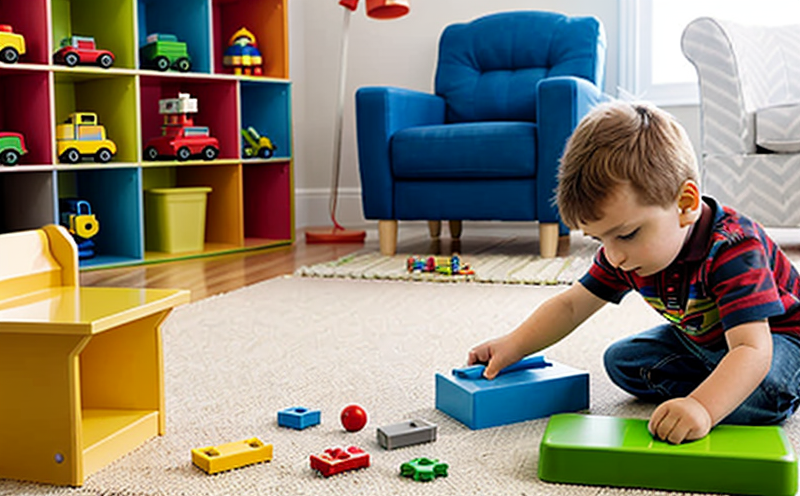Testing for potential fall hazards, sharp edges, or small parts in toys and children's furniture
The Importance of Testing for Potential Fall Hazards, Sharp Edges, or Small Parts in Toys and Childrens Furniture A Necessity for Businesses
As a business owner in the toy and childrens furniture industry, ensuring the safety and well-being of your products is paramount. With millions of children playing with toys and using furniture every day, the risk of accidents is ever-present. One crucial aspect of product testing that cannot be overlooked is evaluating potential fall hazards, sharp edges, or small parts in toys and childrens furniture. This laboratory service, offered by Eurolab, provides businesses with the expertise and resources necessary to identify and mitigate risks associated with their products.
Why is Testing for Potential Fall Hazards, Sharp Edges, or Small Parts Essential?
The consequences of ignoring safety testing can be severe. Product recalls, damaged reputations, and even lawsuits are just a few potential outcomes of neglecting this critical aspect of product development. In the highly competitive toy and childrens furniture industry, it is essential to demonstrate commitment to safety and quality.
Advantages of Using Eurolabs Testing Services
Our comprehensive testing services offer numerous benefits for businesses
Enhanced Product Safety By identifying potential fall hazards, sharp edges, or small parts, we enable companies to take corrective action, thereby reducing the risk of accidents and injuries.
Compliance with Regulations Our laboratory adheres to international standards and regulations, ensuring that your products meet required safety standards and can be marketed in various regions without issues.
Increased Customer Trust Demonstrating a commitment to product safety fosters customer loyalty and trust, setting you apart from competitors.
Cost Savings Preventing accidents and injuries can save companies significant costs associated with recalls, litigation, and damage to reputation.
Improved Quality Control Our testing services help identify areas for improvement, allowing businesses to refine their manufacturing processes and products.
Benefits of Choosing Eurolabs Testing Services
Expertise and Experience Our laboratory is staffed by experienced professionals who specialize in toy and childrens furniture safety testing.
State-of-the-Art Equipment We utilize the latest technology and equipment to ensure accurate and reliable test results.
Quick Turnaround Times Our efficient processes enable rapid delivery of test results, facilitating timely product development and market entry.
Global Recognition Eurolabs certification and compliance with international standards guarantee that your products meet global safety requirements.
Common Questions Answered
Q What types of testing services do you offer?
A We provide comprehensive testing for potential fall hazards, sharp edges, or small parts in toys and childrens furniture, ensuring adherence to relevant regulations and standards.
Q How long does the testing process take?
A Our state-of-the-art equipment and efficient processes enable rapid turnaround times for test results.
Q Do you offer any certifications or compliance documentation?
A Yes, we provide certification and compliance documents for your products, ensuring they meet international safety standards.
Q What if my product fails a safety test?
A In the event of non-compliance, we work closely with your business to identify areas for improvement and assist in implementing necessary changes.
Conclusion
Testing for potential fall hazards, sharp edges, or small parts is an indispensable aspect of ensuring product safety. At Eurolab, our comprehensive testing services cater specifically to the needs of toy and childrens furniture manufacturers. By partnering with us, businesses can
Enhance product safety
Comply with regulations and standards
Build customer trust
Save costs associated with accidents and injuries
Improve quality control
Dont compromise on product safety entrust your testing requirements to the experts at Eurolab.
-
Testing consumer products for compliance with child safety standards to prevent accidents or injury
-
Evaluating the safety of toys, furniture, or household products intended for children to ensure they are hazard-free
-
Simulating potential risks associated with sharp edges, small parts, or choking hazards in children's products
-
Verifying the non-toxicity of materials used in toys, clothing, and other products for children
-
Testing the effectiveness of safety features, such as safety locks, child-resistant packaging, and protective barriers
-
Assessing the durability of products to ensure they do not break into dangerous pieces when used by children
-
Simulating everyday interactions with children's products to assess risks of injury or malfunction
-
Testing toys for compliance with strict regulations on non-toxic paints, plastics, and other materials
-
Verifying that products designed for children, like furniture or playsets, meet structural integrity standards
-
Ensuring that products do not contain hazardous chemicals, heavy metals, or other harmful substances
-
Testing children's products for electrical safety, ensuring that no risk of shock or electrical malfunctions exists
-
Verifying the effectiveness of child safety mechanisms in baby gear, such as car seats, strollers, and cribs
-
Simulating real-world child behavior to assess the potential risks posed by everyday products
-
Testing products designed for children to ensure they do not present hidden dangers such as entrapment or suffocation risks
-
Assessing toys, clothing, and other products for proper labeling and safety instructions to ensure safe usage
-
Testing the safety of play materials and environments, including furniture, playground equipment, and toys
-
Simulating the risk of burns or injuries from hot surfaces, liquids, or other hazards present in children's products
-
Verifying that safety features such as rounded corners, soft edges, and other protective elements are present in design
-
Verifying that products meet local and international safety standards and certifications for children's goods
-
Assessing the physical and chemical properties of children's products to ensure they are safe and durable




